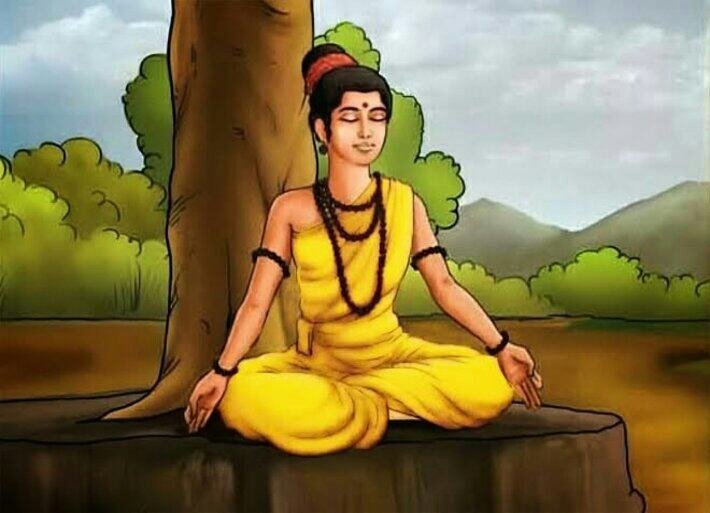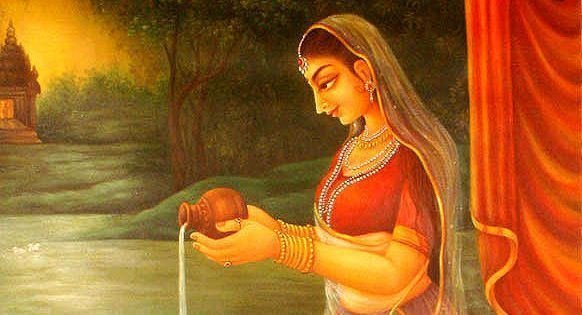Maitreyi: The Trailblazer of Women’s Vedic Knowledge

Maitreyi was one of the great female saints of India who chose the path to immortality over her husband’s materialistic wealth. She was a highly learned and knowledgeable sage paving the educational path for women to come. Having written ten hymns for the Rig Veda, Maitreyi has become one of the few women philosophers who contributed to the vedas. She has truly become a muse for many women with her profound vedic knowledge and contributions.

There are two life accounts of Maitreyi. One says that she was an Advait follower and remained celibate throughout her life. Whereas, the other account says that she was the second wife of sage Yajnavyalka. Renowned as ‘Brahmavadini’ meaning speaker of the Brahmana, Maitreyi was born in later vedic period to rishi Maitri. She was named Maitreyi after her father. She was born in the eastern region of Mithila under king Janaka’s rule. She had deep knowledge and understanding of vedas since her early childhood. Even as a tender child she was never mesmerized by the materialistic possessions and was always in quest of spirituality.
As she grew up her divine spirituality and thirst for acquiring more knowledge also accelerated. As a result, she became a devoted disciple of the great sage Yajnavyalka. Yajnavyalka was already a married man with three sons from his first wife Katyayani. The wife of sage Yajnavyalka, Katyayani was deeply moved by Maitreyi’s fervent and passionate will to gain knowledge and allowed her to marry her husband. In this way Maitreyi tied the knot with her spiritual teacher and from here her odyssey of ultimate spirituality began.

Maitreyi’s knowledge increased ten times by being in the company of Yajnavyalka and she composed ten hymns for the Rig Veda. She was having a happy time with her husband learning new things and increasing the repository of her knowledge.
The turning point in Maitreyi’s life came when her husband sage Yajnavyalka decided to renounce his materialistic and worldly life and become a wandering ascetic. Before embarking on his ascetic journey, he thought of equally bifurcating the property between his two wives. So, he called Maitreyi to tell her about his decision. Listening to his decision Maitreyi posed some deep and philosophical questions trying to unravel the understanding of life, death, and immortality. This conversation between Maitreyi and sage Yajnavyalka is widely famous underscoring the fact that how in vedic period even women were allowed in philosophical discourse.
Maitreyi asked, “If now, Sir, this whole earth filled with wealth were mine, would I be immortal thereby?”
“No”, said Yajnavalkya. “As the life of the rich, even so would your life be. Of immortality, however, there is no hope through wealth.”
Then said Maitreyi: “What should I do with that through which I may not be immortal? What you know, Sir – that, indeed, tell me!”
Yajnavalkya replied to Maitreyi: “Ah! Lo, dear as you are to us, dear is what you say! Come sit down. I will explain to you. But while I am expounding, do seek to ponder thereon.”
And then Yajnavalkya elucidated in depth the concept of immortality and how to achieve it. He tells her how for achieving immortality one needs to distance oneself from the crowd and worldly relations, attachments, and possessions.

The discourse on atma between Yajnavalkya and Maitreyi explores the theme of love.
Lo, verily, not for love of a husband is a husband dear, but for the love of the Self a husband is dear.
Not for the love of the wife is a wife dear, but for love of the Self a wife is dear.
Concluding his dialogue on the “inner self”, or soul, Yajnavalkaya tells Maitreyi:
One should indeed see, hear, understand and meditate over the Self, O Maitreyi; indeed, he who has seen, heard, reflected and understood the Self – by him alone the whole world comes to be known.
After this discourse Maitreyi renounces all the worldly possessions, attachments, and relations and sets out on a path of achieving eternal bliss and immortality.

Achievement
The notable achievements of Maitreyi are:
- She was the trailblazer of women’s vedic knowledge and education. She exemplified through her life and knowledge that women can be at par with their male contemporaries if given the opportunity.
- Maitreyi is one of the few female saints whose hymns are published in the oldest Rig Veda. She has contributed ten hymns to the Rig Veda.
- The Maitreyi College of University of Delhi is named after her.
- A retreat location, Matreyi Vedic Village, in Tamil Nadu is also named after.
- She is mentioned in plethora of vedas and scriptures. She is prominently featured in Brihadaranyaka Upanishad.
- Her philosophical inquiries, particularly her dialogue with Yajnavalkya, explore fundamental concepts of Vedanta, a major school of Hindu philosophy. Her questions and reflections highlight the importance of knowledge and understanding in attaining spiritual wisdom.

Soon after the sage Yajnavalkya became an ascetic, Maitreyi also followed in his footsteps and became a sannyassini. She embraced the life of an ascetic wanderer in the pursuit of eternal bliss and spirituality.
Maitreyi is no more but her divine and profound legacy and contributions to the vedas have left an indelible mark that still continues to inspire millions. Maitreyi truly is an embodiment of women empowerment, women knowledge, and women education.


